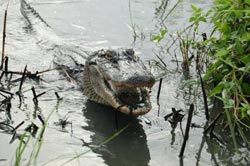Crocs eat fruit??

PLEASE PASS THE FRUIT -- A new WCS-led study says American alligators (pictured) and 12 other crocodilians consume fruit, in addition to their usual meat heavy diets.<br><br>Credit: Phillip "Scooter" Trosclair<br>
It turns out that alligators do not live on meat alone. Neither do Nile crocodiles. A new study led by the Wildlife Conservation Society says that the American alligator and a dozen other crocodile species enjoy an occasional taste of fruit along with their normal meat-heavy diets of mammals, birds, and fish.
The study gives new insight into the possible role that crocodilians, some of which have large territories, may play in forest regeneration through digesting and passing seeds from fruits.
The study appears in the July issue of the Journal of Zoology. Authors include: Steven Platt of the Wildlife Conservation Society; Ruth M. Elsey of the Louisiana Department of Wildlife and Fisheries; Hong Liu of Florida International University and the Fairchild Tropical Botanic Garden; Thomas R. Rainwater of the U.S. Fish and Wildlife Service; James C. Nifong of the University of Florida; Adam E. Rosenblatt and Michael R. Heithaus of Florida International University; and Frank J. Mazzotti of University of Florida.
The authors looked at 18 species of crocodilian ranging from the American alligator to the fearsome Nile crocodile and found 13 of the species consumed some form of fruit including a variety of berries, legumes, nuts, and grains.
While the authors say some of the fruit ingestion may have been incidental to prey capture, evidence shows that other fruit is consumed deliberately and in large quantities. Much remains to be learned about how crocodilians process carbohydrates and other plant-based nutrients, though studies suggests that fruit eating is likely to yield nutritional rewards for crocodilians.
“Although underreported, fruit eating appears widespread among crocodilians,” said the study's lead author, Steven Platt of the Wildlife Conservation Society. “Given the biomass of crocodiles in many subtropical and tropical wetlands and their capacity for ingesting large numbers of fruits, we consider it likely that crocodilians function as significant seed dispersal agents in many freshwater ecosystems.”
The Wildlife Conservation Society saves wildlife and wild places worldwide. We do so through science, global conservation, education and the management of the world's largest system of urban wildlife parks, led by the flagship Bronx Zoo. Together these activities change attitudes towards nature and help people imagine wildlife and humans living in harmony. WCS is committed to this mission because it is essential to the integrity of life on Earth. Visit http://www.wcs.org.
CONTACT: STEPHEN SAUTNER: (1-718-220-3682; ssautner@wcs.org)
JOHN DELANEY: (1-718-220-3275; jdelaney@wcs.org)
Media Contact
More Information:
http://www.wcs.orgAll latest news from the category: Studies and Analyses
innovations-report maintains a wealth of in-depth studies and analyses from a variety of subject areas including business and finance, medicine and pharmacology, ecology and the environment, energy, communications and media, transportation, work, family and leisure.
Newest articles

Properties of new materials for microchips
… can now be measured well. Reseachers of Delft University of Technology demonstrated measuring performance properties of ultrathin silicon membranes. Making ever smaller and more powerful chips requires new ultrathin…

Floating solar’s potential
… to support sustainable development by addressing climate, water, and energy goals holistically. A new study published this week in Nature Energy raises the potential for floating solar photovoltaics (FPV)…

Skyrmions move at record speeds
… a step towards the computing of the future. An international research team led by scientists from the CNRS1 has discovered that the magnetic nanobubbles2 known as skyrmions can be…





















